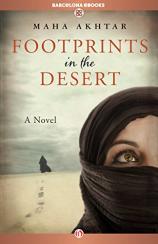Reading Group Guide
Discussion Questions
Footprints in the Desert

1. Why do you think the book was titled FOOTPRINTS IN THE DESERT? What does this image make you think of in the context of the novel?
2. Noura, newly widowed, has very little time to grieve the loss of her husband because of the imminent danger in Beirut. How does Noura balance her personal sorrow with the will to survive?
3. In chapter 4, there is a distinct difference in the development of Salah and Noura. While Salah steps up to take command not only of the engineering and military operations (the latter being entirely new to him), Noura falls into a hole of self-doubt and pity. How does this affect the beginnings of their relationship?
4. What is the role of Salah's mother, Saydeh, in the novel?
5. Coming to terms with one’s own culpability and feelings of guilt is a large theme in the novel. What do you think of Salah's reaction to Nassim's capture? Do you think his plans to rescue the boy are motivated by concern for his safety or by his fear that Nassim's capture may compromise the mission?
5. Do you agree with Salah's decision to continue on despite his friends' deaths, or is Noura right when she says that he is a traitor who continues "to plot with their murderers"?
6. By the end of chapter 7, we see that Salah has involved Rania, Noura, Saydeh and Fatmeh in the revolt simply by their association with him. Do you think it is fair that he relies on those around him without explaining to them the situation or the potential danger they are in?
7. When we are introduced to Lawrence of Arabia (T. E. Lawrence), what do you think of him as a character and his involvement in the war? Is he one of the foreign traitors that Noura speaks of?
8. FOOTPRINTS IN THE DESERT depicts how people become involved in large-scale rebellions; from Maha Akhtar's novel, we see that some people, such as Noura, are pulled into the historical moment because they are protecting their loved ones. How would you describe Salah's evolution as a revolutionary? How have his motivations changed as the book progresses?
9. On page 170, what does Salah mean when he says that he is a "reluctant revolutionary?"
10. Early on, we see how nationalism and the dream of an independent, united Arab state is one of the driving forces behind the Arab Revolt of 1916. On page 28, Prince Faisal says to Salah Masri, "So you think that Arab nationalism is an ideology? That it does not really exist? Or cannot exist?" Prince Faisal hints at the fact that there is a difference between nationalistic pride and ideological nationalism. What do you think this difference is? How does each type of nationalism potentially affect a society’s development?
11. On page 220, Nassim's mother, when discussing Salah’s role in bringing Nassim into the revolution, says, "Who is he to meddle in my life and Nassim's?... He knows Nassim has no father…he has manipulated my son and filled him with all these crazy ideas. Isn't it enough that I lost my husband? Do I also have to lose my son?"Is Takla being fair to Salah? Is Salah manipulating Nassim?
12. What are the different types of love in the novel? How do they affect the larger narrative? Consider the relationships of the women in the café, Madame Yvonne, Fatmeh, Rania and Saydeh.
13. Do the women of FOOTPRINTS IN THE DESERT exemplify female stereotypes? What are their roles in the novel?
14. What is the relationship between the men and women in the novel?
15. On page 107, Salah says to Noura "Endings are inevitable, Noura…. An ending can be the end of a year, the end of a summer, the end of a war, or the death of someone we loved. Whatever they are, endings always make us feel sad. But we move on. And the people we have lost along the way are the small clear voices in our heads that will be with us always." What is your reaction to Salah’s words? How do Salah and Noura differ in their coming to terms with endings?
16. How is death, as a prevalent phenomenon in the novel, treated and discussed by both the narrator and protagonists?
17. Why do you think Lawrence and Salah choose to go out of their way to rescue Charles, but not Nassim, Hisham and Rabih?
18. While told from the third-person perspective, the novel is structured in such a way that Maha Akhtar is able to still articulate the thoughts of each character and hone in on their experience. What are the advantages and disadvantages of this wide scope?
19. Who is the narrator of this book? Is he/she simply an omniscient voice telling a story?
20. Based on the context of the novel, what do you believe is the relationship between trust and friendship during the rebellion? Do you believe that there are extreme circumstances in which the betrayal of friendship can be justified?
21. Why does Maha Akhtar center the ending of the novel on the personal relationships rather than the political circumstances? What was the role of the historical backdrop? Was the novel primarily about a historical event or tales of romance?
Footprints in the Desert
- Publication Date: August 4, 2015
- Genres: Espionage, Fiction, Historical Fiction, Historical Thriller, Literary Fiction, Suspense, Women's Fiction
- Paperback: 375 pages
- Publisher: Barcelona Editions
- ISBN-10: 1497690390
- ISBN-13: 9781497690394








